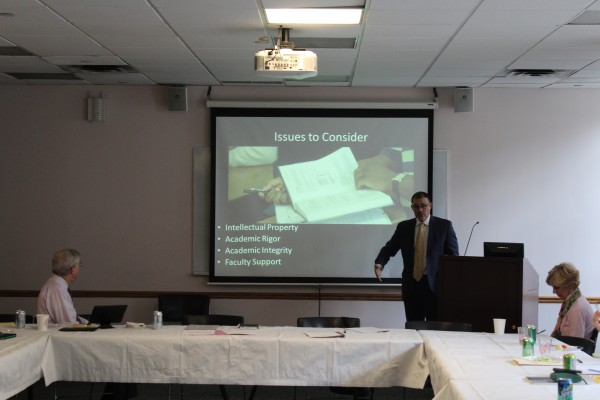College Council Approves Change to Major, Talks Online Classes
Steve D’Agustino, director of Online Learning, giving a presentation of how to manage and teach an online class through systems like BlackBoard. (PHOTO BY CONNOR MANNION/THE OBSERVER)
March 14, 2016
On March 10, College Council reconvened to continue their discussion on the approval of online summer classes for all undergraduates, and Karina Hogan, associate professor and associate chair of department of theology, brought to a vote to change the women’s studies major to “a more appropriately titled, ‘Women, Gender and Sexuality.’”
“It’s really a change to acknowledge the changes that have happened in the field in the past 20 years. All the other Jesuit institutions have something like women and gender studies [instead of just women’s studies], so this isn’t an outside-the-norm change,” Hogan said.
The department is also proposing modifying the curriculum with three new required courses, “gender and sexuality studies, queer theories and feminist and women’s studies to represent the new aspects of the program,” Hogan continued, noting the senior capstone that is required now would remain the same, and the number of required courses would not change either. College Council voted unanimously in favor of this change. “Well, that was easy,” Rev. Robert Grimes, dean of Fordham College at Lincoln Center, remarked after the vote.
A large part of the meeting was dedicated to educating the members of College Council on how online courses are administered. Steven D’Agustino, director of Online Learning at Fordham University, was invited to give a presentation to the council to facilitate discussion.
“The idea again is if Fordham students can take Fordham online courses if they are not in the New York City area for the summer,” Grimes said.
According to Grimes, this came up because via request of a dance major, who was also attempting a business minor. She had asked to be enrolled in an online course while she was with a dance intensive in Chicago.
D’Agustino explained that online courses can work through Blackboard or any other learning management system (LMS). “The structure of these online courses are already established mainly in the Graduate School of Social Services, which is ranked number one in online social work programs,” he said.
Certain courses were not offered online, according to D’Agustino, like mathematics. “Every course has modules in the banner that is designed to make students click through instead of scrolling constantly.” D’Agustino also explained that there were a number of programs to encourage online participation. “One I used in my course is called VoiceThread,” he said, which “allows students to respond via video, audio recording or text to content posted in the module.”
“One of the concerns is being in the physical presence of other students, and VoiceThread can somewhat create that,” he continued.
A vote was not made affirmatively in favor or against online courses during the meeting, due to a lack of time. “You all need to go back to your departments and see what their read on it is, then at the next College Council meeting we can have a structured discussion and perhaps come to a decision,” Grimes said.
Grimes reminded faculty present to also attend the upcoming Diversity Task Force meetings, one of which followed that day’s meeting. He also reminded the council of the Ars Nova research symposium on April 14, and congratulated various alumni for recent achievements.
“At the Grammy Awards, Tim Kubart, who was a theatre major here and graduated in 2007, took home his first Grammy for best children’s album. Later in the evening, “Hamilton” won a Grammy for best musical theatre album, and Ephraim Sykes, who was originally a member of the class of 2007 but graduated in 2011, performed and was featured on that album,” Grimes said.









